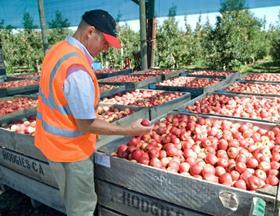
While deregulation of New Zealand’s apple export sector brought many advantages, it has also caused some significant opportunities to go untapped in the European trade, leaving the industry millions of dollars out of pocket.
That is the opinion put forward by Ian Palmer, chairman of peak industry body Pipfruit New Zealand, who is championing the development of a more unified export model to Europe.
“It is well documented what changes have occurred over the last eight years `since deregulation`; some good, some not so,” Mr Palmer told Fruitnet.com.
“While deregulation has opened many more opportunities, it can be strongly argued that it has also left money on the table, as well as the loss of promotional opportunities and the use of a ‘Brand New Zealand’. This alone is a serious lost opportunity.”
Mr Palmer explained that the current European export model leaves no room for coordinated branding or promotion, putting New Zealand at risk of being dragged by the market into a spiral of declining prices, something that he said could be seen in the current apple season.
“We have 44 exporters supplying fruit `to Europe` without any coordination into a relatively small market with a short sales window and this is just not sensible,” he stated. “We have not necessarily developed relationships with the customer or the consumer.
“I have asked the exporter sector to look at what is happening, and look at what ways we can consolidate our operations on shore, allowing a more controlled pathway to the market.”
A return to the single-desk export system is not on the table; in the long term, Mr Palmer is simply aiming for a system that allows maximum leverage of a New Zealand-wide brand.
“New Zealand is a small player in global terms, but well recognised as a strong ethical trader with excellent traceability and food safety, and world-leading production systems. We have not been using these to our advantage.”
Many of the country’s exporters have acknowledged the issue and are discussing options, according to Mr Palmer, which is the first step in finding a practical way forward.
Getting those 44 exporters to work towards the same goal is going to be the hardest aspect of the proposal. Several models are now being discussed, Mr Palmer told Fruitnet.com, and a ‘brand New Zealand’ is also currently in the pipeline.
“We’re just typical Kiwis – unassuming,” he concluded. “It’s time to promote ourselves.”



